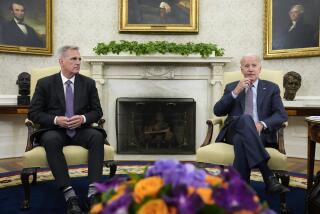COLUMN RIGHT : Bush Has Undermined His Own Party : He is unwilling to make the case for the side that elected him.
- Share via
Make no mistake, President Bush and his senior advisers have lost badly in the budget wars. Headlines around the country represent the President as being confused and unsure of himself on taxes. He has only himself to blame.
Two years ago, he campaigned and was elected on the plain and simple promise of no new taxes. Four months ago, he allowed himself to be persuaded by budget negotiators that “tax revenue increases” were needed to reduce the deficit. There was a gleam in the TV anchormen’s eyes that night. Journalists covering the White House knew a fatal compromise when they saw one.
Since then, things have not gone well for the GOP. After months of secret meetings, a deal was worked out with Democratic leaders. Rep. Robert Walker (R-Pa.) has been one of the few to point out that the deal included $150 billion in spending increases and $134 billion in new taxes to pay for them. Some deficit reduction. Rep. Newt Gingrich of Georgia, the House minority whip, saw this as a repudiation of the Republicans’ defining issue. The GOP was unwittingly aligning itself with the Democrats. He opposed the deal, and a few days later it was voted down in the House.
We are now back to partisan budget-making, which at least has the virtue of clarity. Republicans, however, remain gravely undermined because the President no longer stands for much of anything on the domestic front. Indeed, it is possible that within a week or two he will actually be campaigning for a package of tax increases voted through by Democrats in Congress. In which case he will have made a 180-degree turn on his most potent issue.
Since June, when he changed his mind on taxes, Bush’s repeated displays of philosophical aimlessness have confirmed the worst fears of conservatives. His goal in the budget struggle, he said recently, is to show “that we can still govern.” But governing is not an end in itself. The pursuit of a well-defined political goal requires vision--already dismissed by Bush as “the vision thing.” Then again, he said a few days ago that he aspired “to keep the process moving forward.” As has been repeatedly shown in recent years, “the process” will take unwary politicians to unsuspected destinations.
In pursuing a bipartisan deal, secretly negotiated, Bush showed not only a distaste for politics but also a failure to understand the passions that animate politics. In the nature of things, there can be no satisfactory bipartisan solution to the problem of deficit spending because the country is deeply divided on the relevant issues. The President seems not to grasp the reality of this division, which cannot be papered over in private meetings. Strikingly, a few days ago Bush conceded that he was not comfortable with domestic politics. In foreign affairs, by contrast, “people really basically want to support the President,” he said. But a President uncomfortable with domestic affairs is not in the right line of business.
There is only one way that the problem of the federal budget can be sensibly addressed, and that is for the President to take his case to the American people. He could use the media, which is forever at his disposal. He could say: “Americans are overtaxed,” or: “I would like to try to cut back on the size of government and I need your help.” He could show that he perceives the political fault lines and is willing to make the case for the side that elected him. But this is what he will not do, and it can only be because he does not feel strongly enough about the issues to take such a stand. President Reagan showed that a conservative message is also a winning one. But President Bush seems not to have absorbed this lesson in his eight years as Reagan’s vice president. That is why conservatives are disheartened at this moment.
Consider this. Last weekend, the government was briefly shut down--but at a time when tourists and museum visitors were hurt, not federal employees. Nonetheless, it was a perilous moment for bureaucrats because the unwelcome distinction was publicly made between “essential” and “non-essential” workers: 87,000 of the latter at the Department of Health and Human Services, for example, 80,000 in the Department of Agriculture, 30,000 in the Commerce Department. But on Monday morning, they were all back at work, and Bush held a press conference in which he said: “I want to recognize the valiant federal work force that had to suffer through some uncertainty in this period.” Is he on their side, then? There has been much talk of shared sacrifice, pain to be borne equally by all Americans. Are government workers alone to be exempt from this? If Bush showed that he understood this issue, conservatives would be encouraged. And at this late date, surprised.
More to Read
Get the L.A. Times Politics newsletter
Deeply reported insights into legislation, politics and policy from Sacramento, Washington and beyond. In your inbox twice per week.
You may occasionally receive promotional content from the Los Angeles Times.










